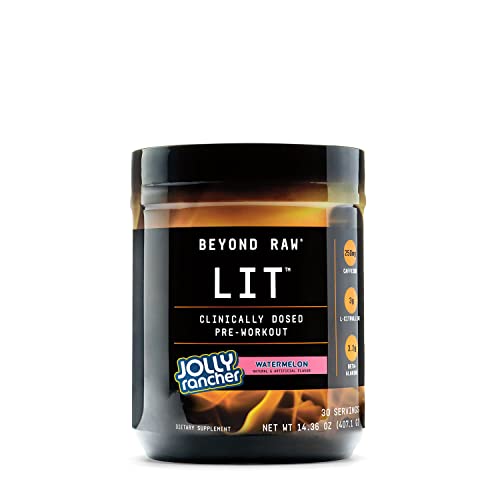
Top 14 Pre-Workouts of 2024: Boost Your Workout Performance
The Ultimate Guide to the Best Pre-Workouts and the Evolution and Impact of Pre-Workout Supplements.
12/02/2024 17:02:49
Pre-workout supplements are designed to enhance physical performance, endurance, and energy levels during exercise. The inception of pre-workouts can be traced back to the early 1980s, with the emergence of energy-boosting products targeted at bodybuilders and athletes looking for an edge in their training routines. Initially, these products were simple formulations, often containing caffeine or amino acids to help increase energy and focus. Over time, the market for pre-workouts expanded, with manufacturers developing complex blends of ingredients, including nitric oxide precursors, creatine, beta-alanine, and various stimulants, to provide a more comprehensive range of performance benefits.
The popularity of pre-workout supplements skyrocketed in the late 2000s and early 2010s, driven by increased awareness of fitness and health, the rise of social media, and endorsements from fitness influencers and athletes. As gym culture grew, so did the demand for products that could provide an immediate boost in performance and recovery. The marketing of pre-workouts often highlights dramatic improvements in energy, stamina, muscle growth, and recovery times, making them highly appealing to a broad audience beyond professional athletes, including casual gym-goers and those pursuing personal fitness goals.
The U.S. Food and Drug Administration (FDA) does not approve dietary supplements, including pre-workouts, in the same way it does pharmaceuticals. However, it does monitor their safety and can take action against any supplement that poses a risk to consumers. There are concerns regarding the safety and regulation of pre-workouts, as some products have been found to contain banned substances or dangerous levels of stimulants. These risks include potential cardiovascular problems, anxiety, insomnia, and digestive issues. Despite these concerns, many people find pre-workouts beneficial for increasing energy levels, improving focus during workouts, and enhancing overall exercise performance. Consumers are advised to research products thoroughly, consult with healthcare professionals, and consider their tolerance and health conditions before incorporating pre-workouts into their fitness regimen.
NOSSA SELEÇÃO
Transparent Labs Lean Pre-Workout, BCAA, Amino Acids, Keto Friendly, Energy Powder, Stamina, Muscular Strength & Endurance, Tropical Punch, 30 Servings, 30 Servings (Pack of 1)
Improve Strength and Better Absorption: Citrulline malate is the '' star child'' of pre-workout science; We chose citrulline malate over L-arginine because it provides better absorption, higher plasma arginine levels, and has been found to: Improve strength, aerobic performance, and muscle endurance; Be at least twice as effective as L-arginine supplementation at raising nitric oxide; Enhance the use of branch chain amino acids like leucine during exercise; Greater Energy and Endurance with BCAA: Valine is essential in pre-workout supplementation due to its involvement in metabolism and muscle growth; It helps to reduce tryptophan build-up in the brain and allows for greater energy and endurance; Leucine is a strong activation of the gene responsible for protein synthesis which significantly increases strength and prevents muscle degradation while preserving lean mass; Isoleucine aids metabolism during workouts and executes anti-catabolism effects Made with Natural Ingredient: Gluten-Free, Non-GMO, No Artificial Sweeteners, No Artificial Coloring, No Artificial Sweeteners, no Creatine and No Artificial Preservatives; PreSeries LEAN contains fermented vegan BCAAs and is a vegan-friendly product Lean Mass and increased cellular carnosine levels: Beta-Alanine increases cellular carnosine levels, which are quickly depleted during intense exercise; Most pre-workout supplements contain beta-alanine but at significantly underdosed levels; Proper dosing of STIM-FREE delays the onset of neuromuscular fatigue in men and women during intense exercise and Promotes the formation of healthy proteins Significantly increase lean mass and decrease fat in wrestlersBSN N.O.-XPLODE Pre Workout Supplement with Creatine, Beta-Alanine, and Energy, Flavor: Fruit Punch, 60 Servings
N.O.-XPLODE PRE-WORKOUT IGNITER – legendary pre-workout with industry heritage that has helped athletes train harder since 2011 ADVANCED INGREDIENT TECHNOLOGY – re-engineered to help you push you past previous limits THE ULTIMATE PUMP PRE-WORKOUT – Supports explosive energy, intense focus, and maximum performance AMAZING FLAVORS – Fruit Punch, Blue Raz, Grape, Green Apple, Watermelon 9 SIZES AVAILABLE – 30 servings or 60 servings Product Note: Exposure to heat or sunlight may lead to melting/damage of product. Hence customers are expected to be available during the product deliveryJYM Supplement Science Pre JYM Pre Workout Powder - BCAAs, Creatine HCI, Citrulline Malate, Beta-Alanine, Betaine, and More Naturally Flavored Island Punch Flavor, 30 Servings
Quality ingredients - Pre JYM pre-workout powder contains the best ingredients to optimize your workout. It has bccaa's and Creatine for muscle growth, Citrulline Malate and caffeine for endurance, plus beta-alanine and Betaine for strength. Brand: JYM Supplement Science Package Dimensions: 21.0 L x 7.25 H x 16.0 W (inches) Item Package Weight: 25.0 poundsKaged High Stimulant Pre Workout Powder | Fruit Punch | Pre-Kaged Elite | L-Citrulline | Creatine | Beta Alanine | 388mg Caffeine | Nitric Oxide Booster | 20 Servings
DOMINATE YOUR WORKOUTS*: PRE-KAGED Elite was designed for athletes who want to take their performance to the next level. With 20 premium ingredients, including 9 patented ingredients, this all-in-one pre-workout powder will help you achieve heightened energy, sharp mental focus, and bigger pumps than ever before. It's so powerful, you'll never use another pre-workout product again. ENERGY WITHOUT THE CRASH*: PurCaf organic caffeine from non-GMO green coffee beans gives you clean, sustained energy that will help you push through even the most grueling workouts. Taurine, tyrosine, and branched chain amino acids (BCAAs) provide essential nutrients that help your muscles recover faster so you can get back in the gym sooner. MASSIVE PUMPS: Creatine Nitrate (NO3-T) is a 2-in-1, patented and highly effective form of creatine that works as a nitric oxide booster helping produce incredible muscles pumps. NO3-T can enhance endurance, allowing you to train harder, longer. NEXT LEVEL POWER: ElevATP is a cutting-edge nutritional technology that helps increase lean muscle mass. It can also help you produce more strength and power output during training sessions. ElevATP is scientifically proven to help increase energy levels and ATP production. LASER-LIKE MENTAL FOCUS*: The intense focus blend in PRE-KAGED Elite was designed to help you obliterate your workouts. With ingredients like Alphasize Alpha-Glyceryl Phosphoryl Choline, which is a premium ingredient that is known for its ability to support cognitive function and memory.* In addition, it helps protect cells from damage.BEYOND RAW LIT | Clinically Dosed Pre-Workout Powder | Contains Caffeine, L-Citrulline, and Beta-Alanine, Nitric Oxide and Preworkout Supplement | Jolly Rancher Watermelon | 30 Servings
ABOUT THE PRODUCT: Beyond Raw LIT’s clinically dosed pre-workout powder for men and women helps you train with focus, intensity and pumps POWER THROUGH YOUR DAY: Enjoy additional energy and focus on both training and non-training days when you incorporate Beyond Raw LIT into your daily routine PEAK PERFORMANCE: Contains 1.5g of Nitrosigine, 3g of L-Citrulline, 3g of CarnoSyn Beta-Alanine and 250mg of caffeine per serving to support nitric oxide production, energy, and mental intensity FORMULATION: Enjoy the benefits of enhanced energy and performance with a gluten-free and sugar-free formula. ABOUT THE BRAND: For over 85 years, GNC has been the leading the way in global health and wellness. GNC is committed to meeting the highest standards of quality, safety and efficacy while applying the most up-to-date advances in nutritional science. Whether you're just getting started, or you need to keep going, GNC is committed to sparking your motivation and supporting your desire to live well.Alani Nu Pre Workout Powder | Amino Energy Boost | Endurance Supplement | Sugar Free | 200mg Caffeine | L-Theanine, Beta-Alanine, Citrulline | 30 Servings (Cosmic Stardust)
PRE WORKOUT PUMP: Turn your workouts up a notch with our flavor packed Pre-Workout. Formulated to provide you with 200mg of caffeine, sourced naturally from coffee beans to provide sustained and steady energy. The endurance and performance you need, in crisp flavors you deserve. INCREASE PERFORMANCE: Take 20-30 minutes before your workout for sustained energy and endurance to help achieve your fitness goals. Alani Nu Preworkout contains essential amino acids like L-Theanine to prevent you from crashing, Citrulline to improve the amount of oxygen in your muscle tissue, provides enzymes crucial to cardiovascular health, and beta alanine to regulate lactic acid accumulation in muscles. CRAVABLE FLAVORS: Don’t wait for cheat day! Indulge in delicious flavors like Hawaiian Shaved Ice, Mimosa, and Blue Slush – all without the sugar. Check out all of our preworkout flavors in the Alani Nu Brand Store. GLUTEN FREE, VEGAN AND SUGAR FREE: Alani Pre Workout is formulated to be gluten free, vegan and no sugar to keep the goodness within each jar of pre-workout. 100% transparent ingredients mean no proprietary blends, so you know exactly what you’re putting into your body ALANI NU PRE-WORKOUT: Here for your taste buds – Alani Nu was founded in 2018 by entrepreneur and influencer, Katy Hearn, Alani Nu is a health and wellness brand focused on providing low-calorie products with unique flavors. Check out everything else from Alani Nu and follow us through our brand store to stay up to date on all things Alani! Alani pre-workout is not recommended for Children, People Sensitive to Caffeine, Pregnant Women or Women NursingCellucor C4 Ultimate Pre Workout Powder ICY Blue Razz - Sugar Free Preworkout Energy Supplement for Men & Women - 300mg Caffeine + 3.2g Beta Alanine + 2 Patented Creatines - 20 Servings
BUILD STRENGTH - Formulated with a Super Citrulline Pump Matrix to support ultimate pumps and an increase in nitric oxide INCREASE REP COUNT - Formulated with CarnoSyn Beta-Alanine, a premium clinically studied beta-alanine, which has been studied to support muscular endurance and fight fatigue MORE SCOOPS, PLEASE - Formulated with a patented and clinically studied compound that may help the body prolong its caffeine tolerance buildup ULTIMATE ENERGY - Get your ultimate workout started with 300 mg of caffeine. DELICIOUS FLAVORS UNLIKE ANYTHING ON THE MARKET - Cotton Candy, Icy Blue Razz, Orange Mango, Sour Batch Bros, Strawberry Watermelon, Freedom Ice, and Mango FoxtrotREDCON1 Total War Preworkout - Contains 320mg of Caffeine from Green Tea, Juniper & Beta Alanine - Pre Work Out with Amino Acids to Increase Pump, Energy + Endurance (Sour Gummy Bear, 30 Servings)
Total War Preworkout for Men & Women - Formulated with amino acid beta alanine to enhance muscular endurance and reduce exhaustion. Total War preworkout delivers rapid, fast-acting power & focus for a transformative workout you didn't think was possible. Unstoppable Power - This award-winning pre workout contains 320mg of active caffeine powder with 250mg of caffeine anhydrous, a dehydrated form that promotes alertness and wakefulness + 100mg of di-caffeine malate, which slows the release to help you dominate even your most challenging workouts. Professional Grade Formula - 6g of l citrulline malate + 45mg of green tea extract + 150mg of juniper helps boost nitric oxide levels to deliver nutrients and help increase blood flow. Our 'pump' effect keto pre workout is formulated with premium ingredients backed by science and made for athletic people of all skillsets. Noise Worthy Flavors - Not for the faint of heart, our pre workout powder for women & men packs a flavorful punch you'll make excuses to use. Every scoop offers a delicious and refreshing flavor that never sacrifices your workout energy for taste. All-In-One Workout Supplements - Total War is a powerful combination of stimulants and focus factors along with N.O. compounds making it your go to taurine powder. 30 clinically dosed servings per container for cardio intense days, this preworkout will have you energized for hours.OPTIMUM NUTRITION Gold Standard Pre-Workout with Creatine, Beta-Alanine, and Caffeine for Energy, Flavor: Fruit Punch, 30 Servings
vitamin d provides immune support Product Note: Exposure to heat or sunlight may lead to melting/damage of product. Hence customers are expected to be available during the product delivery packaging may vary - new look, with the same trusted quality! 175mg of caffeine- help fuel your mind and body to train at the highest level 3g creatine - help support overall performance 1.5g beta-alanine - help support enhanced endurance 1.5g citrulline malate - a precursor to nitric oxide 375mg acetyl-l-carnitine hcl and 250mg n-acetyl-l-tyrosine banned substance tested - helps ensure you can trust what you are putting in your body 4 delicious flavors available - blueberry lemonade, green apple, watermelon candy, fruit punch.4 delicious flavors available – blueberry lemonade, green apple, watermelon candy, fruit punc; Allergen information: soyJacked Factory NITROSURGE Pre Workout Supplement - Endless Energy, Instant Strength Gains, Clear Focus, Intense Pumps - NO Booster & Preworkout Powder with Beta Alanine - 30 Servings, Cherry Limeade
Pre Workout Powder for Energy, Strength, & Blood Flow: Nitrosurge is a creatine-free pre-workout for men and women, formulated with evidence-based ingredients that boost nitric oxide (NO), energy, and strength for hours on end. As a best rated pre workout supplement , Nitrosurge delivers peak performance, laser focus, and intense pumps every single training session. Best Pre-Workout Supplement for Athletes & Gym-Goers: We went the extra mile to create a science-backed, pre workout powder that helps improve body composition and athletic performance without the side effects of harsh stimulants and banned ingredients. Nitrosurge contains clean, effective, and pure ingredients that athletes and gym-goers can count on, including L-Citrulline, Betaine Anhydrous, Beta-Alanine, Caffeine, L-Theanine, and more. Nitric Oxide Boosting Pre Work Out Supplement: Nitrosurge elevates muscle pumps during training thanks to clinical doses of L-Citrulline and Betaine Anhydrous — two proven nitric oxide boosters. Feel the satisfaction of skin-tearing pumps every time you hit the gym with this best-rated pre-workout supplement. Ingredients Backed by Science. Nitrosurge pre-workout powder optimizes the key components of athletic performance — energy, mental sharpness, focus, muscle pumps, strength, and stamina — with ingredients that are backed by science and clinical research. Manufactured in a cGMP-Certified Facility: All Jacked Factory products are manufactured under stringent quality control standards to ensure proper purity and potency. This formula is completely free of harsh chemicals, fillers, and artificial food dyes.GHOST BCAA Powder Amino Acids Supplement, Sour Patch Kids Blue Raspberry - 30 Servings - Sugar-Free Intra, Post & Pre Workout Amino Powder & Recovery Drink, 7G BCAA Supports Muscle Growth
BCAAs and Epic Flavors: GHOST BCAAs and SOUR PATCH KIDS Blue Raspberry flavor…what’s not to love? Enjoy your favorite sour candy flavor during your workout, throughout the day, or before a night out. 30 servings per container. 7G BCAAs: GHOST BCAA delivers a massive 7G of vegan-fermented BCAAs (3500MG Leucine, 1750MG Isoleucine and 1750MG Valine) per scoop. Made with Astragin: Astragin helps improve your body’s ability to absorb key amino acids, proteins, and glucose…In other words, this ingredient ensures you’re getting maximum benefits in every scoop. Total Transparency: All GHOST products feature a transparent label that fully discloses the dose of each active ingredient. Zero proprietary blends means you know what you’re getting in each and every scoop. GHOST BCAA is vegan-friendly, soy-free, gluten-free, and sugar-free. BE SEEN: As a premium active lifestyle brand, GHOST is powering and empowering users to BE SEEN beyond the walls of the gym. The name GHOST and mantra “BE SEEN” come from that feeling of being behind the scenes and wanting to be heard, waiting to make an impact. We’re all Ghosts. This is our time.Cellucor C4 Sport Pre Workout Powder Watermelon - Pre Workout Energy with Creatine + 135mg Caffeine and Beta-Alanine Performance Blend - NSF Certified for Sport 30 Servings
C4 PRE WORKOUT POWDER FOR MEN & WOMEN - America's Number 1 Selling Pre-Workout Brand has been trusted since 2011 with over 2 billion servings sold* Optimized for exercise to beat your personal best and crush your goals BUILD MUSCLE & STRENGTH - Formulated with a nitrogen-containing compound designed to build lean muscle mass, maximize performance, and increase strength in all athletes - from pro to everyday INCREASE REP COUNT - Formulated with CarnoSyn Beta-Alanine, a premium clinically studied beta-alanine, which has been studied to support muscular endurance and fight fatigue and may cause a harmless tingling sensation TESTED & TRUSTED BY THIRD PARTIES - Proudly NSF Certified for Sport, an independent certification program recognized by the United States Anti-Doping Agency (USADA), Major League Baseball, the National Hockey League and the Canadian Football League DELICIOUS FLAVORS UNLIKE ANYTHING ON THE MARKET - Blue Raspberry, Fruit Punch, and Watermelon. Take one serving (1 scoop) of C4 Sport, mixed with 6-8 fl. oz. of water 20 - 30 minutes before trainingInsane Labz Psychotic Gold, High Stimulant Pre Workout Powder, Extreme Lasting Energy, Focus, Pumps and Endurance with Beta Alanine, DMAE Bitartrate, Citrulline, NO Booster (Cherry Bomb, 15 Servings)
ENERGY. FOCUS. PUMPS. What happens when you take the original pre workout and add a full serving of citrulline and agmatine? You get GOLD, the biggest pump boosting pre-workout available. GOLD is formulated to give you the cleanest burst of energy and razor sharp, long after your workout has ended. Scientifically backed ingredients include: L-Citrulline, Beta Alanine and Agmatine Sulfate. When added to GOLD, these NO boosters allow for vein boosting pumps like no other supplement on the market. The unique combination of NO boosters and focus enhancers make GOLD one of the most sought after pre-workouts on the market. To top it off, Insane Labz added their patented ingredients OXYgold and AMPiberry to better absorb all the ingredients for maximum results.Six Star Pre Workout PreWorkout Explosion | Pre Workout Powder for Men & Women | PreWorkout Energy Powder Drink Mix | Sports Nutrition Pre-Workout Products | ICY Rocket Freeze(30 Servings)
PREWORKOUT ENERGY SUPPLEMENTS – Pre Workout Explosion boosts energy with a powerful 135mg dose of caffeine anhydrous to enhance mental focus and workout intensity Product Note: Exposure to heat or sunlight may lead to melting/damage of product. Hence customers are expected to be available during the product delivery MUSCLE PUMPS – Hardcore muscle pumps are a result of the potent ingredients taurine, L-citrulline, L-citrulline malate and L-arginine hydrochloride PRE WORKOUT – Six Star Pre Workout Explosion delivers more energy, enhanced focus, and incredible muscle pumps for the best workouts.PERGUNTAS & RESPOSTAS
What are the benefits of taking pre-workout supplements?
People often ask about the potential benefits of pre-workouts to determine if these supplements align with their fitness goals. Pre-workouts can enhance physical performance by increasing energy levels, improving endurance, boosting strength, and sharpening focus and concentration during exercise. The specific benefits can vary depending on the ingredients used in the pre-workout formula.
Are there any side effects or risks associated with pre-workout supplements?
Given the potent ingredients in many pre-workout formulas, individuals are rightly concerned about potential adverse effects. Side effects can include jitteriness, insomnia, digestive upset, increased heart rate, and high blood pressure, especially in those sensitive to stimulants like caffeine. People often seek advice on how to minimize these risks or whether certain conditions or medications might contraindicate the use of pre-workouts.
What are the common ingredients in pre-workout supplements and their effects?
This question arises from curiosity about what is in pre-workout supplements and how these components work to provide the promised benefits. Common ingredients include caffeine (for energy and focus), creatine (for energy and muscle building), beta-alanine (for reducing muscle fatigue), BCAAs (branched-chain amino acids for muscle recovery), and nitric oxide precursors (like L-arginine or L-citrulline for improving blood flow and muscle pumps).
CRITÉRIOS
POSTS RELACIONADOS
POSTS RECENTES
CATEGORIAS
DISCLAIMERS
- Consult a healthcare professional before consuming any type of food, supplement or vitamin.
- Selektz may receive commissions for sales made through links published on our pages.
- The information about the products listed is based on the product websites or marketplaces that sell the products.
- This article is not intended to provide or replace nutritional advice from a professional or medical professional.



















